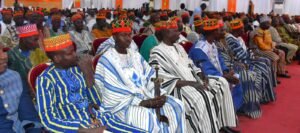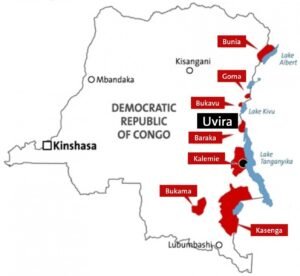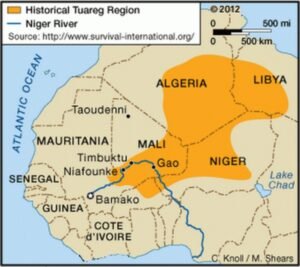Nuru’s Analysis
Nuru’s Analysis are bi-monthly deep dives into topics that are shaping African geopolitics. Through researched articles, we want to provide an understanding of current events, and to look further into the root causes, implications and consequences of such happenings. Our articles are based on reliable sources, mainly research papers, newspapers, work of experts and so on and so forth.
- Burkina Faso : recognises the role of traditional chiefdom
 During the Council of Ministers on February 12, Burkina Faso decided to regulate “one of the oldest institutions in our history,” granting the country’s customary and traditional chieftaincy a defined role and function, integrated into the national legal framework.… Read more: Burkina Faso : recognises the role of traditional chiefdom
During the Council of Ministers on February 12, Burkina Faso decided to regulate “one of the oldest institutions in our history,” granting the country’s customary and traditional chieftaincy a defined role and function, integrated into the national legal framework.… Read more: Burkina Faso : recognises the role of traditional chiefdom - Libya : Minister Of State survives assassination attempt in Tripoli
 Libyan Minister of State for Cabinet Affaire Adel Jomaa was shot in an assassination attempt while in his car in Tripoli, the national unity government announced. The authorities launched an investigation to identify the assailants and denounced the attack… Read more: Libya : Minister Of State survives assassination attempt in Tripoli
Libyan Minister of State for Cabinet Affaire Adel Jomaa was shot in an assassination attempt while in his car in Tripoli, the national unity government announced. The authorities launched an investigation to identify the assailants and denounced the attack… Read more: Libya : Minister Of State survives assassination attempt in Tripoli - DRC : Towards the regionalization of the war
 As war rages in eastern DRC following the capture of Goma by the M23, the risk of regionalizing the conflict is increasing. Burundi, which has decided to support the Congolese Armed Forces (FARDC), declared that the fall of Bukavu,… Read more: DRC : Towards the regionalization of the war
As war rages in eastern DRC following the capture of Goma by the M23, the risk of regionalizing the conflict is increasing. Burundi, which has decided to support the Congolese Armed Forces (FARDC), declared that the fall of Bukavu,… Read more: DRC : Towards the regionalization of the war
Sudan War : a guide to understanding the “world’s worst humanitarian crisis” - February 8th 2025
 Sudan is experiencing one of the worst humanitarian crises of our time—state collapse, mass displacement, and the deadliest famine in a century. Often reduced to a “General’s war,” this framing oversimplifies a conflict that has uprooted millions and killed thousands. Understanding its full impact requires a deeper look into Sudan’s history, economic foundations, and political trajectory, as well as the geopolitical and diplomatic forces at play. Only by tracing these roots can we grasp how a war, fought over power, is tearing apart a country ten times the size of the UK.
Sudan is experiencing one of the worst humanitarian crises of our time—state collapse, mass displacement, and the deadliest famine in a century. Often reduced to a “General’s war,” this framing oversimplifies a conflict that has uprooted millions and killed thousands. Understanding its full impact requires a deeper look into Sudan’s history, economic foundations, and political trajectory, as well as the geopolitical and diplomatic forces at play. Only by tracing these roots can we grasp how a war, fought over power, is tearing apart a country ten times the size of the UK.
The root causes of the post Gaddafi Libya Crisis - January 26th 2025
 In 2024, Libya remains plunged in a deep political and economic crisis, marked by the division of the country between two rival governments. On one side, the UN-recognized government of Abdel Hamid Dbeibah, based in Tripoli (west); on the other, a government supported by Marshal Khalifa Haftar, based in the east. This discord came to a head with the Central Bank crisis in September, when Governor Sadiq Al-Kebir was ousted by the western authorities, provoking an immediate riposte from the east. In response, oil production and exports were halted, leading to a significant drop in oil production, essential to the Libyan economy.
In 2024, Libya remains plunged in a deep political and economic crisis, marked by the division of the country between two rival governments. On one side, the UN-recognized government of Abdel Hamid Dbeibah, based in Tripoli (west); on the other, a government supported by Marshal Khalifa Haftar, based in the east. This discord came to a head with the Central Bank crisis in September, when Governor Sadiq Al-Kebir was ousted by the western authorities, provoking an immediate riposte from the east. In response, oil production and exports were halted, leading to a significant drop in oil production, essential to the Libyan economy.
The Lobito Corridor - November 24th 2024
 The Lobito Corridor, a major railway project through Angola, stands as a microcosm of Africa’s evolving geopolitical landscape, reflecting the continent’s growing importance as a stage for international competition.
The Lobito Corridor, a major railway project through Angola, stands as a microcosm of Africa’s evolving geopolitical landscape, reflecting the continent’s growing importance as a stage for international competition.
Built during the colonial rule, the Lobito Corridor is today in the center of international investments rivals, to connect minerals rich regions to the sea and facilitate te crossing of this vast region of central Africa. In this new geopolitical landscape, African railways are no longer mere connectors of places, they are pathways to power. The continent’s leaders, aware of this reality, find themselves navigating a delicate balance, leveraging external interest to build critical infrastructure while safeguarding their sovereignty. Discover today the angolan strategy in consortium with neighbour countries Zambia and DRC.
The Congo Basin : World’s lung - November 2nd 2024
What if the protection of the Congo Basin forest, the lung of Africa, was a source of revenue for the central African countries that preserve it ?
 The Congo Basin, green area around the Congo river (third longest world river), is home to one of the world’s richest rainforests. This vast ecosystem, containing approximately 10% of the planet’s biodiversity, hosts unique species and peatlands as large as Great Britain. These forests are crucial for global carbon absorption and oxygen production, earning them the title “lungs of Africa.” Recently, the Congo Basin has even surpassed the Amazon as the world’s largest natural carbon sink, absorbing vast quantities of carbon and helping regulate Earth’s climate.
The Congo Basin, green area around the Congo river (third longest world river), is home to one of the world’s richest rainforests. This vast ecosystem, containing approximately 10% of the planet’s biodiversity, hosts unique species and peatlands as large as Great Britain. These forests are crucial for global carbon absorption and oxygen production, earning them the title “lungs of Africa.” Recently, the Congo Basin has even surpassed the Amazon as the world’s largest natural carbon sink, absorbing vast quantities of carbon and helping regulate Earth’s climate.
Despite its ecological importance, the Congo Basin faces a complex challenge: how can these nine countries balance the need for environmental protection with the development needs of their populations? Must they choose between preserving this essential ecosystem and alleviating poverty? These questions are urgent as the climate crisis escalates.
Terrorism in Mozambique - October 20th 2024
 Mozambique is geographically located in south-east Africa, bordered by the Indian Ocean to the east, Tanzania to the north, Malawi and Zambia to the north-west, Zimbabwe to the west, and Eswatini and South Africa to the south. This country, rich in natural resources, has a history marked by Portuguese colonization, followed by a war of liberation that led to independence in 1975.
Mozambique is geographically located in south-east Africa, bordered by the Indian Ocean to the east, Tanzania to the north, Malawi and Zambia to the north-west, Zimbabwe to the west, and Eswatini and South Africa to the south. This country, rich in natural resources, has a history marked by Portuguese colonization, followed by a war of liberation that led to independence in 1975.
Could Namibia become the world’s new energy hub ? - September 28th 2024
Since 2022, international firms have been drilling wells off the coast of Namibia, a country located in Southern Africa, and bordered by the Atlantic Ocean. Its southern border is shared with South Africa. The country also shares a border with Botswana to the East, and with Angola as its Northern neighbor. International interest around the country’s potential to become a new oil producer, regional energy hub has been growing.
Though it could take five years before the oil started to flow, companies like TotalEnergies (France), Galp (Portugal), Shell (United Kingdom), have been involved in the process.
Azawad : a Tuareg rebellion - September 14th 2024
As former rebels from the Azawad independence movements in northern Mali became increasingly hostile towards the Malian transitional government, the Malian army, accompanied by its Russian auxiliaries from the originally Wagner militia, carried out a drone operation in Tinzawatene (a town on the Algerian border) at the end of July 2024, targeting positions held by these movements. This operation resulted in casualties, leading the recently formed coalition of movements, the CSP-DPA, to retaliate violently, causing the deaths of 150 soldiers, according to the coalition itself. This marks the Malian army’s biggest loss since the Transitional President Assimi Goïta took power in 2020.
In this episode, we will try to understand the origins of the independence claims made by some populations in northern Mali and why, in 2024, the region remains a battlefield.

